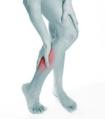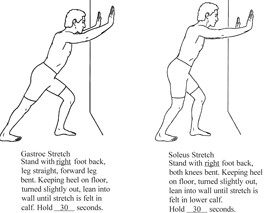 Muscle cramps are involuntary muscle contractions of one or more muscles. These spasms can be quite painful lasting a couple seconds to 15 minutes or longer. A muscle cramp can recur several times before it resolves. Muscles of the feet, calves, thighs, hands, arms and abdomen are prone to spasm. Whether you are out for a run, in the car or going to sleep, muscle cramps come without warning. A common question we get at our clinic is what causes these cramps and how can you relieve them?
Muscle cramps are involuntary muscle contractions of one or more muscles. These spasms can be quite painful lasting a couple seconds to 15 minutes or longer. A muscle cramp can recur several times before it resolves. Muscles of the feet, calves, thighs, hands, arms and abdomen are prone to spasm. Whether you are out for a run, in the car or going to sleep, muscle cramps come without warning. A common question we get at our clinic is what causes these cramps and how can you relieve them?
Potential Causes of Muscle Cramps
Injury: Following an injury, muscle cramps can occur as a protective mechanism. Muscle spasms help to minimize movement, stabilizing the injured area.
Vigorous activity: Exercise related cramps are likely caused by muscle fatigue. In normal functioning muscles, inhibitory messages are sent to the muscle to prevent it from contracting too strongly. When the muscle fatigue, this inhibitory message is decreased causing overstimulation to the muscle. This results in a muscle cramp.
Dehydration: Dehydration can occur through excessive fluid loss when sweating and/or inadequate fluid intake. Dehydration increases the likelihood of muscle cramps.
Muscle cramps can also be caused by an underlying factor:
Mineral deficiency: Low levels of calcium or magnesium in the blood causes increased excitability of the nerves and the muscles that they stimulate. Increased muscle stimulation can result in muscle cramping.
Nerve compression: Spinal nerve irritation or compression can cause cramp-like pain.
This may be accompanied by weakness or sensory changes.
Poor circulation: If blood vessels become narrow due to arteriosclerosis, blood supply to the extremities become decreased. This can result in muscle cramps that are more likely to occur when you are walking or exercising but stops with rest.
Kidney, thyroid, hormone and liver disorders: Muscle cramps can be complications of an organ disorder. For example, hypoglycemia and anemia can cause muscle cramps.
Drug side effect: Various drugs such as those used for blood pressure, Alzheimer’s disease, high cholesterol and others can cause muscle cramps.
What can you do?
Stretch: Most muscle cramps will relax if the muscle is stretched. This can sometimes be accomplished by standing up and walking around or changing positions. Stretching the specific muscle group in spasm may also be required. For instance, if your calf is in spasm, stretch is by performing these 2 stretches. 
Massage: Gently massaging the muscle in spasm may help to relax the muscle.
Heat: Applying a heat pack to the muscle cramp or having a warm bath may also help to get the muscle to relax.
Prevent the cramp: There are a number of things you can do to prevent muscle cramps from happening in the first place:
a) Stay well hydrated
b) Ensure adequate dietary intake of nutrients and minerals
c) Stretch before and after physical activity
d) Rest: get enough sleep and allow sufficient time for muscles to rest and recover after exercise
Physical therapy: If your muscle cramp is the result of an injury, physical therapy can help to decrease muscle tone and spasm and rehabilitate underlying injuries.
Note: Cramps that are a result of organ disorders, nerve compression, poor circulation or drug complications may need further medical investigation for appropriate treatment.
For more information about Kinetic Physiotherapy, visit our website:http://www.kineticphysiotherapy.ca Contact Kinetic Physiotherapy via e-mail:info@kineticphysiotherapy.ca or phone: 905-637-1414 to set up an appointment.
Great summary! Most are unaware of all the causes of muscle cramping and too often I see patients just resolving to live with them. Thanks for the info, will share!
Great article! I find most patients to be mineral deficient. Once this is remedied they rarely ever get anymore cramps and if so they are greatly reduced in intensity.
Great article! The stretches you provided in your blog worked wonders for me during pregnancy when I had all kinds of muscle cramps!
Awesome Blog. This is something everyone should read. I will be sure to share the stretches and the nutritional recommendations.
Thank you for sharing the types, causes and treatments available for cramping. It is reassuring that there are solutions for each type you mentioned.
This is something I get asked about very often from my patients. I will direct them to the blog for sure. Thank you for breaking it down so nicely!
Great post on muscle cramps. Would love to share this with my patients if you are ok with that.
Thank you for the comment. We would love for you to share this with your patients.
Great information for all. So many people don’t know what to do when cramping. I will be sure to share this with my patients
Terrific post but I was wanting to know if you could write a
litte more on this topic? I’d be very grateful if you could elaborate a little
bit more. Kudos!
Order Muscle Factor X: What specifically were you looking for? Let us know and we can answer any questions.